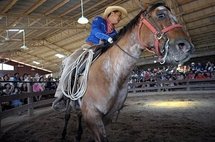
(AFP/File/Pornchai Kittiwongsakul)
"You can say it comes from the Vietnam War, but most people these days find out about (cowboys) from the films," says Surasak Sitawanamas, owner of Cowboy City resort where the festival was held last month.
Wearing a fur pelt over his left shoulder on top of a sheepskin coat, Surasak says he had dreamed of setting up the 65-room cowboy-themed hotel ever since he was a child.
"I've loved cowboys since I was little. My schoolfriends and I would watch a lot of Westerns and I decided that one day I would open my own cowboy resort," says Surasak, citing US actor John Wayne as his hero.
While some attending the festival -- and others like it -- wear fancy dress for the occasion, many say they work as cattle herders and that for them, being a cowboy is a way of life.
Partygoer Wilai Chomchono arrives wearing a purple cowboy shirt decorated with cattle skulls and a neck scarf, his beard plaited and carrying three leather holsters on his belt.
"I was one of the first cowboys in this area, I have been living with horses for all my life, this is why I am a cowboy, I always wear this," he says.
As the strains of singer John Denver play in the background, Wilai watches his two sons practise their lasso skills and offer horse rides to revellers at the hoedown.
Ranch hands sit chatting around small fires in the festival grounds, as pigs turn on spits for dinner.
On stage a band with a banjo player strums country songs and theme tunes from Western television classics such as Bonanza and Maverick.
Several miles (kilometres) away, far from the grounds of Cowboy City's festival, another glimpse of America's southern culture is being beamed by satellite to a television at a streetside food stall.
Men eating spicy Thai soup on their lunchbreak stare transfixed at the latest rounds of a rodeo competition taking place in Texas.
"The landscape of this region is ripe for cowboys because we're on a plateau," says festival promoter Boonsong Singha, who also publishes a magazine about Thai cowboy culture.
"And the outfit is good for farming," he adds. "The hat shields you from sun, and the boots and jeans protect you in the fields."
Some revellers even opt for Native American costume instead of cowboy gear.
A government official calling himself Mr Oh wears a huge feathered headdress with a fringed suede tunic and rows of beads around his neck.
He says it is his tenth visit to a cowboy festival and he is selling memorabilia at one of the festival stalls.
"After I came the first time I realised that I really love it. What makes it attractive to me is the freedom. Cowboys and Indians have a free life," said Oh.
-----------------------------------------------------------------------
Wearing a fur pelt over his left shoulder on top of a sheepskin coat, Surasak says he had dreamed of setting up the 65-room cowboy-themed hotel ever since he was a child.
"I've loved cowboys since I was little. My schoolfriends and I would watch a lot of Westerns and I decided that one day I would open my own cowboy resort," says Surasak, citing US actor John Wayne as his hero.
While some attending the festival -- and others like it -- wear fancy dress for the occasion, many say they work as cattle herders and that for them, being a cowboy is a way of life.
Partygoer Wilai Chomchono arrives wearing a purple cowboy shirt decorated with cattle skulls and a neck scarf, his beard plaited and carrying three leather holsters on his belt.
"I was one of the first cowboys in this area, I have been living with horses for all my life, this is why I am a cowboy, I always wear this," he says.
As the strains of singer John Denver play in the background, Wilai watches his two sons practise their lasso skills and offer horse rides to revellers at the hoedown.
Ranch hands sit chatting around small fires in the festival grounds, as pigs turn on spits for dinner.
On stage a band with a banjo player strums country songs and theme tunes from Western television classics such as Bonanza and Maverick.
Several miles (kilometres) away, far from the grounds of Cowboy City's festival, another glimpse of America's southern culture is being beamed by satellite to a television at a streetside food stall.
Men eating spicy Thai soup on their lunchbreak stare transfixed at the latest rounds of a rodeo competition taking place in Texas.
"The landscape of this region is ripe for cowboys because we're on a plateau," says festival promoter Boonsong Singha, who also publishes a magazine about Thai cowboy culture.
"And the outfit is good for farming," he adds. "The hat shields you from sun, and the boots and jeans protect you in the fields."
Some revellers even opt for Native American costume instead of cowboy gear.
A government official calling himself Mr Oh wears a huge feathered headdress with a fringed suede tunic and rows of beads around his neck.
He says it is his tenth visit to a cowboy festival and he is selling memorabilia at one of the festival stalls.
"After I came the first time I realised that I really love it. What makes it attractive to me is the freedom. Cowboys and Indians have a free life," said Oh.
-----------------------------------------------------------------------









 Home
Home Politics
Politics









